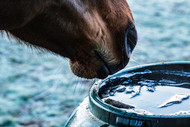It’s been mighty chilly of late, which means you need to monitor your horse hydration!
Freezing weather is just as risky for horse hydration (if not more so) than the hottest summer temperatures. Dehydration increases the risk of impaction colic in horses.
A horse needs to drink around 12 gallons of water a day to keep his digestive system working well. Anything less results in dehydration and a compromised digestive system – the result could be colic.
When it’s very cold the most important thing you can do is make sure your horse’s water trough or water bucket doesn’t freeze over, because most of our equine friends are reluctant to put their noses through even a thin layer of ice, and some just don’t like drinking very cold water at all.
Keeping water unfrozen is easier said than done if you don’t have the luxury of a water heater in your barn or field shelter, but if you want to avoid the risk of colic in horses you need to find a way.
Horse Hydration: Keeping Water Unfrozen
Keeping water buckets from freezing over if you don’t have electricity available is one of the constant battles faced by horse owners. There are dozens of proposed remedies bandied about on online horse forums, from floating a ball or a bottle of salty water on the surface to adding apple cider vinegar.
Personally, I find one of the best – and most logical – methods is to insulate the water bucket or trough with a layer of straw, sacking or any other suitable material, and partially burying it in the ground (ground source heating!).
Whatever you do, you need to keep a frequent check on your horse’s water supply during the freezing weather, as well as your horse’s state of hydration.
How to Monitor Horse Hydration
As well as making sure he has access to unfrozen water, and checking that he is drinking a fair share of it, you need to look out for signs of dehydration in your horse.
You hopefully know what his normal output of droppings and urine is, and are pretty familiar with his usual energy levels.
Red flags that indicate he may be running low on fluid levels are if he stops passing urine regularly, and/or his urine is dark in colour. He’ll also probably act dull, listless and depressed, and his usually healthy pink gums and inside the eyelids will be dark red.
You can always use the classic “skin pinch” test: take a fold of skin from above the shoulder between your thumb and forefinger, lift it away from the underlying tissue, twist slightly and release it. If the skin “tent” that results stays in place for more than two seconds this could mean the horse is dehydrated. If it remains for five seconds or more that is very serious.
If you’re worried about your horse hydration don’t muck about – call a vet to do a blood test to confirm dehydration and treat it.
Why Horse Hydration is Important for Colic Prevention
It’s simple really. Dehydration slows down gut movement in the horse, preventing ingested feed from moving through efficiently. Feed can therefore accumulate and form a blockage, causing gas and more feed to back up behind it. The result is a painful distention of the intestine and disastrous consequences.
The risks of colic increases in winter not only because of horse hydration issues, but also because horses (especially confined to stalls) spend less time being mobile in winter, and eating dry food rather than fresh forage.
Feed tasty mashes, steam hay, and give your horse as much turn-out as possible to guard against winter colic.
Spring is just around the corner! Meanwhile, enjoy the winter with your horses, keeping them happy and healthy. Totally Tack is here to help so give us a call if you need advice.



